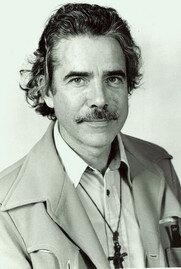The Last Time God Died: Anxiety, Consolation, and the Limitations of Spiritual Language
This is the first in a three-part post by Jay Aquinas Thompson.
Part 1: Theology and “the assumption that man needs God”
My Bright Abyss by Christian Wiman
The risk, of course, is that we might believe the hype about our own intellectual era. Attached as I am to Simone Weil, Christian Wiman, and other intensely atheistic Christian writers, I imagined I’d have fun reading the Death of God theologians—the school of ecumenical 60’s Protestant theology that claimed that God was no longer accessible in human life, was absent. But I found that what this absence means, and how it is to be understood, is very different for different Death-of-Godders. I spent this last winter reading Thomas J.J. Alitzer and William Hamilton’s 1966 essay collection, Radical Theology and the Death of God, expecting to be braced, spooked, and shaken up; instead I learned to relate to my own time differently in how watching how Alitzer and Hamilton related to theirs.
As different as hot and cold, prophet and community man, Alitzer and Hamilton nonetheless share touchstones: Bonhoeffer’s prison letters; Kierkegaard’s assault on the placid, reasonable, bourgeois social construction of Western European Christendom.
William Hamilton
For Hamilton, the “death of God” means the exhaustion of old ideas of transcendence—the eclipse of their explanatory necessity or intellectual plausibility—and the subsequent withering of the old forms of church. Hamilton defines religion not as its rites, nor as a site and source of symbolic vocabulary for spiritual experience; religion, instead, is “any system of thought or action in which God or the gods serve as fulfiller of needs or solver of problems” or “the assumption that man needs God.” But, Hamilton writes, in a dawning world of scientific knowledge, political comity, and material plenty, we Christians no longer need God-the-transcendent-problem-solver. Therefore, we no longer need religion as he has defined it. Instead, he celebrates that our society has (citing his interpretation of Bonhoeffer’s letters) “come of age.” In our era, “it is to the world and not God,” he writes, “that we repair for our needs and problems.” With the transcendent being no longer housed in the forms of Christian worship, we Christians are called instead to find Christ in the world: to build a pluralist and religionless Christianity, centered in Jesus’s love ethic. And now that we no longer need God, he adds, we can perhaps now “delight in him.”
Thomas Altizer
For Alitzer, the death of God is more immediate and painfully felt. He agrees with Hamilton that God is no longer necessary in our culture of human thriving and technological progress. He draws on Hegel’s theory of dialectics to suggest that Spirit had to empty some of itself to make any appearance in the Flesh, in tangible forms such as revelation. The final, ultimate negation of Spirit was Christ’s Incarnation and the Cross. In becoming Flesh, Spirit is no longer accessible to us. And—though this idea anguishes him—he writes that a Christian God who can’t be found in every moment is dead, since Christians enjoy no eternal covenant but the presence of the Spirit, which it’s no longer possible to feel. Further, the explanatory power of science, which cheers Hamilton, breaks Alitzer’s heart. The discovery of the autonomy of nature and the infinity of space have destroyed the intellectual confines of Christendom, because “the world is [now] no longer meaningful by means of anything which might lie beyond it.” Alitzer yearns for a new inbreaking of the Spirit into the world, a future Hegelian “synthesis.” But, until then, we must enter a spiritual “dark night” and accept the “radically profane” nature of our current world. Until then, Alitzer believes that “the Word that is silent in our time is a Word that has been negated by the Word itself.”
More in the next post on how believers often see their own era, for better and for worse.



